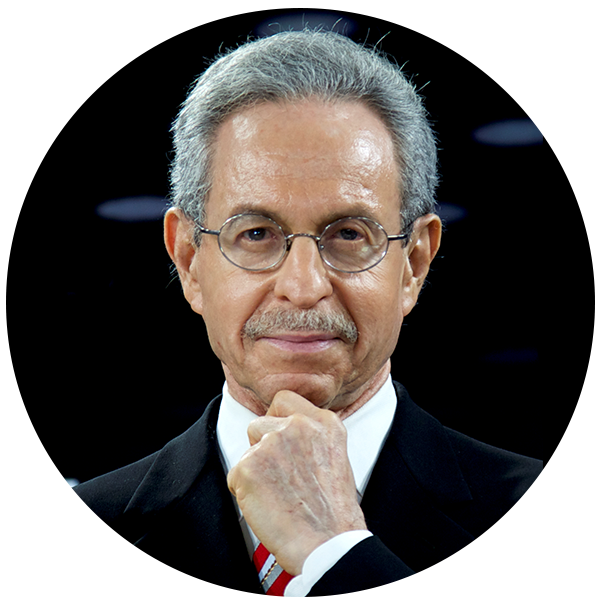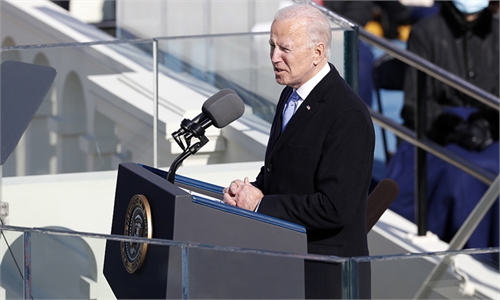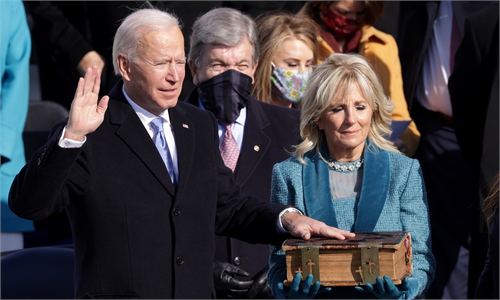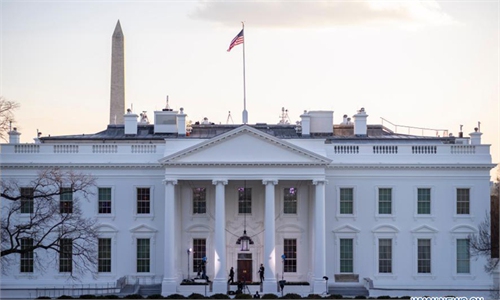US faces both better and worse odds
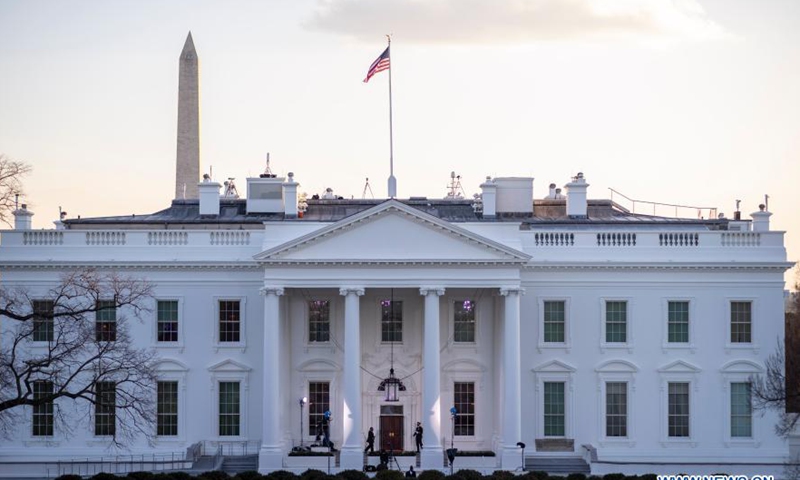
Photo taken on Jan. 20, 2021 shows the White House in Washington, D.C., the United States. U.S. President Joe Biden on Wednesday signed an executive order returning the United States to the 2015 Paris Agreement on climate change. (Photo by Ting Shen/Xinhua)
Editor's Note:With Joe Biden officially sworn in as the 46th president of the US, many are wondering what changes will be done in the world's most powerful (yet declining) country. Will the new administration clean up the mess and lift the US out of the marsh? Or will the US reunite itself to again take the leading role in the world? The Global Times invited scholars from both the US and China to share their points on these issues.
Dr Robert Lawrence Kuhn, chairman of The Kuhn Foundation and recipient of the China Reform Friendship Medal (2018)
From day one, the Biden administration is setting out on a radically different trajectory from the Trump administration in both substance and style. A much larger percentage of the American populace supports Biden over Trump; especially after the storming of the Capitol on January 6. The shift away from Trump will aid the new administration in their vision for governance and compliance. To oversimplify, the Biden Administration will be more sophisticated and inclusive domestically, and more collegial and predictable internationally.
Here are just a few of the areas where the Biden Administration will effect change: national policies on the pandemic (from masks to distribution of vaccines), spending in support of poorer classes, the revision of Trump's tax cuts, and the reimposition of environmental regulations. It will also return to the Paris Agreement, rejoin the World Health Organization, and restore integrity and independence to the Department of Justice with an outstanding Attorney General (the brilliant legal scholar and jurist Merrick Garland). It will reengage with allies to align diplomatically as a rejection of Trump's "America First" doctrine that has antagonized almost every country.
Biden has assembled a team of highly experienced professionals, most of whom he has worked with for years, even decades. There will be none of the dysfunctional "revolving doors" changes of key personnel. In fact, there will be more coherence in the Biden team than in any other recent presidential administration
Though he will be pressured by the left wing of the Democratic Party, Biden will not, I predict, make radical changes in the balance of powers by "stacking" the Supreme Court with liberals or shifting the Senate leftward by giving statehood to Washington DC and Puerto Rico. Biden is a balanced centrist, some would say "boring." But this is just what American now needs.
Isolated theories, often taken out of text or misapplied, will not drive the Biden Administration's policies on US-China relations or on trade more broadly. The key indicator to predict the direction of US-China relations is found in the appointment of the key figures related to China in the State Department, National Security Council, and on matters of trade. All of them are highly experienced and balanced professionals who prize competence and pragmatism above ideology and rhetoric. This bodes well for a calming of bilateral relations, even if it is not a full reset.
The US approach to China will change from blunt-force confrontation and opposition to selective cooperation and diplomatic engagement to communicate on differences. That said, there are indeed real issues that will need to be managed.
The Biden Administration will have the added burden of being accused, in the US political arena, of being "soft on China." I expect that, as professionals, they will rise to the occasion. This will make US-China relations more predictable and less volatile, though there will continue to be significant challenges. China can help by making subtle moves to signal desires to improve relations. We see that beginning to happen.
Shen Yi, professor at the School of International Relations and Public Affairs of Fudan University in Shanghai
The mire the US has fallen into is the division among diverse ethnic groups. Its root cause lies in the inequality of wealth. Combined with issues of race, ethics and immigration, a complicated social division has eventually been forged. Instead of tacking wealth distribution problems, or promoting the common identity as Americans, US politicians reinforces the unique identity of each group in a bid to gain their support.
On the first day in office, Biden took a range of executive actions, the new president revoked a plan to exclude undocumented immigrants from the census count. This is used to determine each state's representation in the House of Representatives.
This order will trigger a strong dissatisfaction among the white and legal immigrants, as this means residents living in this country without a lawful immigration status will be counted as Americans. The purpose of this order is to extend the Democratic Party's voter base. This will change the distribution of electoral votes. As a result, Democrats will gain significant electoral advantage and increase the likeliness to win the next cycle elections over the Republican Party.
The theme for Biden's inauguration was "America United." But the result from signing this order will be a further political and social division in the US, which will go against the "America United" slogan. It is obvious that the appeal of Biden and his team to solidify the country is only lip service. Their actual intent is to safeguard their own vested interests, instead of sincerely uniting this country.
Against this backdrop, rather than bridge domestic divisions, Biden is projected to amplify them.
Biden said it is a priority to fight against the pandemic. Unfortunately, when looking through the first executive orders he made on day one in the White House, the coordination specifics of vaccines is not completely clear. But they should be the linchpin of the battle over COVID-19.
The international community is discussing whether or not Biden will lead the US to re-embrace multilaterism and restore its global leadership. But the US at present cannot play a big role in international organizations. Its return to the WHO is mainly to offset China's influence in this organization. The international community should not set many expectations toward that.
